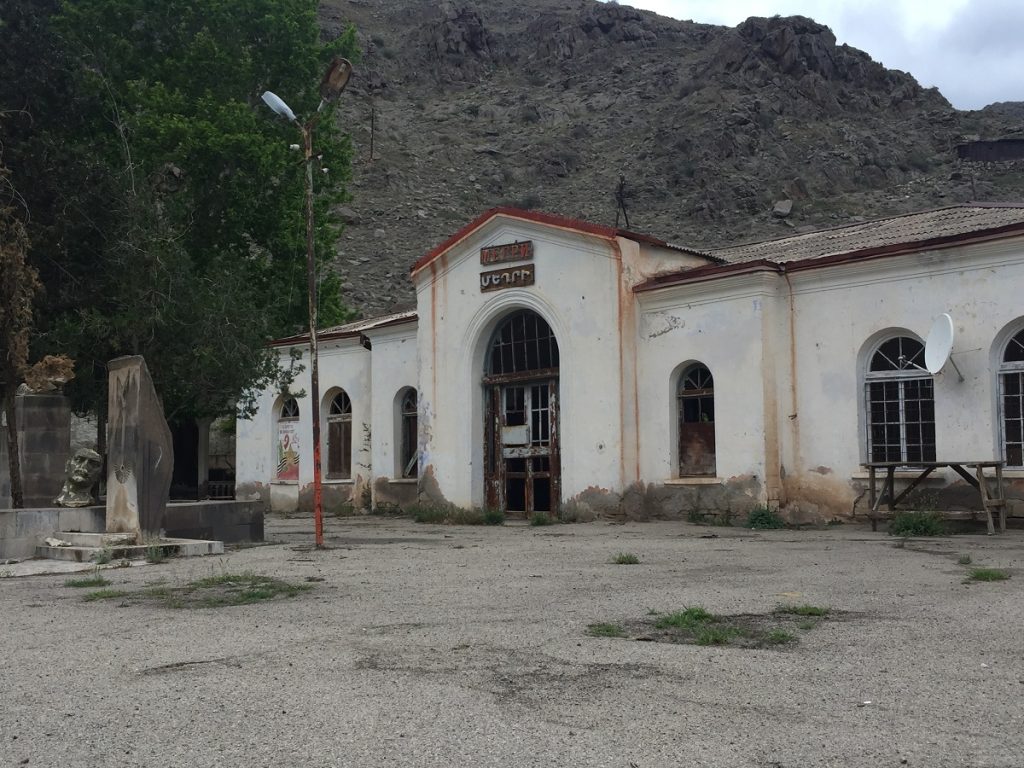Ex-Transport Minister: benefits and drawbacks of Armenian-Azerbaijani railway are yet to be seen
Armenian-Azerbaijani railway
It will takes time to evaluate the effectiveness of the Yeraskh-Julfa-Meghri-Horadiz railway connecting Armenia with Azerbaijan, and those who characterize it in advance as profitable or unprofitable are mistaken – this is the opinion of the former Minister of Transport Henrik Kochinyan. He is one of 10 members of a special working group, which is entrusted with assessing the situation and starting work on the restoration of the railway. The group is headed by Advisor to the Prime Minister, former Armenian Ambassador to Iran Artashes Tumanyan.
If this railway line is restored, it will not only connect Armenia and Azerbaijan – Armenia will also receive a railway connection with Russia and Iran, and Azerbaijan with its exclave Nakhichevan. At the same time, experts explain that the Yeraskh-Julfa-Meghri-Horadiz railway is not considered as a route for exporting goods to Azerbaijan, but as a transit road, in particular, for exporting products to other countries.
- Armenia to begin work on reconstruction of the railway connection with Azerbaijan
- Armenian opposition boycotts parliamentary commission to investigate 2020 war circumstances
- Op-ed: Pashinyan is a politician, not Moses, his words are not commandments
“There are enough specialists in Armenia to restore the railway”
According to the former Minister of Transport Henrik Kochinyan, there are enough specialists in Armenia who can participate in the work on the restoration of the railway on the Armenian side. According to him, both experienced Soviet-era specialists and young people will be involved in the work.
The Yeraskh-Julfa-Meghri-Horadiz railway ceased to operate after the collapse of the Soviet Union. The agreement on the restoration of the railway was reached during a trilateral meeting of the leaders of Armenia, Azerbaijan and Russia at the end of last year in Sochi and was reaffirmed at the Pashinyan-Aliyev talks in Brussels.
In order to restore the railway connection with Azerbaijan, Armenia must build an approximately 45-kilometer section of the road in the southern, Syunik region. According to various estimates, the construction will cost at least $200 million.
It is still unknown when the construction on the Armenian side will begin. It is only reported that in the coming days, detailed studies will be carried out on the ground, at the Yeraskh and Meghri sites, on the basis of which a project will be developed.
Specialists of the Russian Railways company are also involved in these works. Until 2038, this particular company will have the rights to the concession management of the Armenian railways.
The Armenian authorities have repeatedly stated that the opening of railway lines will open up new economic opportunities for the country. However, according to working group member Henrik Kochinyan, it takes time to assess the effectiveness of the project. The volume of freight traffic will change if other states also consider this railway safe and efficient.
“One can say that it is profitable, and the other can say that it is not, but, in my opinion, both are mistaken. It takes time, this is not a formula, which we can take, write on a piece of paper and say, “Look, I proved that this is good” or “I proved that this is bad”, Henrik Kochinyan said.
The Azerbaijani side began construction work in February 2021. The Azerbaijani authorities plan to complete the construction of their part of the road in the first quarter of 2023.
“We need to sign an agreement”
According to Prime Minister Pashinyan’s adviser, head of the working group Artashes Tumanyan, the construction of the railway will begin if the agreements are documented – in a bilateral agreement. He says that this is a necessary condition, because “infrastructures must come together, work together”:
“It is acceptable for the Armenian side to start such large-scale works if they are recorded in the format of any document. It can be either a bilateral agreement or an agreement involving a third party”.
According to Tumanyan, especially in the Meghri area, there is a need for a detailed “instrumental” study. The group will have such an opportunity during the upcoming business trip, it is planned in the next 10 days.
Tumanyan, an adviser to the prime minister, said that the restoration of the Yeraskh section of the railway, which is just over a kilometer long, will take months. The Meghri section, which is approximately 45 km long, will take three years.
Referring to the funds required for the construction, Artashes Tumanyan noted that it is not clear what amount will be required and where it will be raised from. At the same time, he emphasizes that funds will also be needed for the construction of adjacent structures, for example, customs points, otherwise “there will not be a working infrastructure”.




















